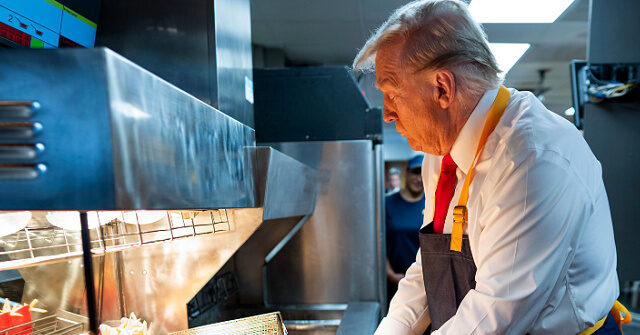Minnesota Governor Tim Walz recently took to social media to express his disapproval after former President Donald Trump was seen working at a McDonald’s in Philadelphia, donning an apron and learning to make french fries. Walz, who is also the vice-presidential running mate of Vice President Kamala Harris, contrasted Trump’s actions with Harris’s past claims that she had worked at a McDonald’s herself. In his post, Walz highlighted Trump’s history of opposing labor rights, stating, “This guy spent decades stiffing workers pay, cut overtime benefits for millions of people, and opposed any effort to raise the minimum wage.” He also drew attention to Harris’s commitment to labor issues, adding, “You know who has actually worked at McDonald’s, joined workers on picket lines, and fights for working people?” implying that Harris has a genuine connection to working-class issues.
During Trump’s visit to the popular fast-food chain, he engaged with several customers, one of whom thanked him for his leadership and expressed support, saying, “You made it possible for ordinary people like us to meet you.” Another customer brought up concerns about the United States potentially following in Brazil’s footsteps. Trump assured them, “We’re going to make it better than ever,” demonstrating his effort to connect with the American public at a grassroots level. These interactions at McDonald’s highlight Trump’s continued appeal to a segment of the population that feels a personal connection to him, despite his controversial history.
Trump’s appearance at McDonald’s coincides with ongoing scrutiny of Harris’s narrative surrounding her alleged employment there. In past interviews, including one with Drew Barrymore, Harris stated, “Yes, I did work at McDonald’s. When I was at school … I did fries. I did fries. I did fries, and then I did the cashier.” However, critics have raised questions about her claims. Notably, it has been pointed out that she never referred to this job in prior campaigns or even in her published books, leading to speculation about the authenticity of her narrative.
Despite the passage of time, Harris introduced the account of her McDonald’s employment during a labor rally while campaigning for the 2020 presidential elections. The absence of this detail in her public statements and official files has fueled skepticism. An investigation by the Washington Free Beacon noted that Harris did not include her McDonald’s job on her resume or job applications earlier in her career. This omission has led to questions about why such a pivotal part of her background was never mentioned before the heat of the presidential race in 2019.
Political figures often highlight past working-class jobs to bolster their authenticity and relatability among voters. Not only does this provide insight into their personal histories, but it can also serve as a testament to their understanding of working-class struggles. Former President Barack Obama famously referenced his teenage job at a Baskin-Robbins ice cream shop to illustrate his connection to everyday American experiences. In contrast, Harris’s recent emphasis on her alleged fast-food role raises eyebrows, as the delay in sharing such a detail could be seen as a strategic move rather than an honest reflection of her past.
Criticism of Trump’s McDonald’s visit did not come solely from Walz; it also included remarks from prominent figures such as MSNBC host Alex Witt and Representative Barbara Lee (D-CA), who dismissed the appropriateness and rationale behind the public appearance. This event continues to stir discussions about the candidates’ connections to working-class Americans, labor rights, and the authentic representation of their personal histories in the political narrative. As the political landscape evolves, both Harris’s claims and Trump’s actions will likely remain focal points in the ongoing discourse surrounding their respective commitments to labor issues and the working-class identity.

